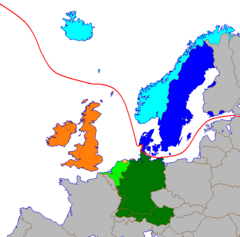West Germanic language: Difference between revisions
No edit summary |
|||
| Line 28: | Line 28: | ||
==History== | ==History== | ||
West Germanic is artificially descended from the language - now known as Anglo-Saxon - of England's Germanic invaders, which displaced the indigenous Brythonic languages. As a result of this, New West Germanic maintains a link with the North Germanic family due to Old Norse's influence on English. Old English was deemed an appropriate root because, under the rule of Anglo-Saxon kings, it thrived, thought to have coined new words from native roots rather than borrow foreign words. This is a trend that continues in the West Germanic language. The Norman Conquest occurred in 1066, marking the beginning of the Middle English era; thereafter, there is no influence on West Germanic. New words added to the lexicon come from modern Dutch, a widely-spoken, present-day relative of Old English, which has linguistically evolved little since the late 16th century. [[Image:Europe germanic languages.PNG]] | West Germanic is artificially descended from the language - now known as Anglo-Saxon - of England's Germanic invaders, which displaced the indigenous Brythonic languages. As a result of this, New West Germanic maintains a link with the North Germanic family due to Old Norse's influence on English. Old English was deemed an appropriate root because, under the rule of Anglo-Saxon kings, it thrived, thought to have coined new words from native roots rather than borrow foreign words. This is a trend that continues in the West Germanic language. The Norman Conquest occurred in 1066, marking the beginning of the Middle English era; thereafter, there is no influence on West Germanic. New words added to the lexicon come from modern Dutch, a widely-spoken, present-day relative of Old English, which has linguistically evolved little since the late 16th century. | ||
[[Image:Europe germanic languages.PNG|240px|thumb|right|The Germanic languages in Europe are divided into North (blue) and West Germanic (green and orange) Languages | |||
{{legend|#00ff00|Low Franconian and Low German}} | |||
{{legend|#008000|High German}} | |||
{{legend|#ff8811|Insular Anglo-Frisian (English, Scots)}} | |||
{{legend|#ffbb77|Continental Anglo-Frisian }} | |||
{{legend|#0000ff|East North Germanic}} | |||
{{legend|#00ffff|West North Germanic}} | |||
{{legend|#ff0000|Line dividing the North and West Germanic languages.}} | |||
]] | |||
Revision as of 04:43, 25 August 2008
| Westgẽmanix | |
|---|---|
| Pronounced: | /west.geə.'mɑ:n.iʃ/ |
| Timeline and Universe: | Present, Earth |
| Species: | Human |
| Spoken: | Europe |
| Total speakers: | Unknown |
| Writing system: | Latin alphabet (West Germanic variant) |
| Genealogy: | Indo-European Germanic |
| Typology | |
| Morphological type: | Inflecting |
| Morphosyntactic alignment: | Nominative-accusative |
| Basic word order: | V2 |
| Credits | |
| Creator: | S.C. Anderson |
| Created: | July 2008 |
(New) West Germanic (Westgẽmanix) is a recent West Germanic language, which is closely related to others such as Dutch, English, Frisian and German as well as sharing some traits with North Germanic languages. West Germanic is a descendant of Old English, with an amount of vocabulary derived from Modern Dutch.
West Germanic grammar is similar to that of Dutch and German, particularly its syntax, but has undergone a degree of deflexion, much more so than Dutch but mostly not to the extent of English. West Germanic has retained the usage of three genders, yet these have become simplified because they now relate purely to biological gender.
As Dutch and English, the consonant system of West Germanic did not undergo the High German consonant shift. Complex consonant clusters are, typically of Germanic languages, allowed by the syllable structure.
West Germanic vocabulary could be said to be more Germanic in origin than its predecessors due to drawing neologisms from compounds of old words whereas others have shunned native words in favour of Latin or Greek equivalents; German followed a similar process, which has however been taken a step further in West Germanic.
History
West Germanic is artificially descended from the language - now known as Anglo-Saxon - of England's Germanic invaders, which displaced the indigenous Brythonic languages. As a result of this, New West Germanic maintains a link with the North Germanic family due to Old Norse's influence on English. Old English was deemed an appropriate root because, under the rule of Anglo-Saxon kings, it thrived, thought to have coined new words from native roots rather than borrow foreign words. This is a trend that continues in the West Germanic language. The Norman Conquest occurred in 1066, marking the beginning of the Middle English era; thereafter, there is no influence on West Germanic. New words added to the lexicon come from modern Dutch, a widely-spoken, present-day relative of Old English, which has linguistically evolved little since the late 16th century.
